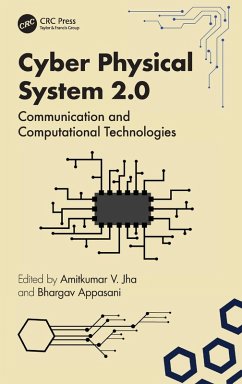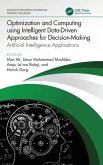Cyber Physical System 2.0
Communication and Computational Technologies
Herausgeber: V Jha, Amitkumar; Appasani, Bhargav
Cyber Physical System 2.0
Communication and Computational Technologies
Herausgeber: V Jha, Amitkumar; Appasani, Bhargav
- Gebundenes Buch
- Merkliste
- Auf die Merkliste
- Bewerten Bewerten
- Teilen
- Produkt teilen
- Produkterinnerung
- Produkterinnerung
The book covers the emerging communication and computational technologies for future cyber-physical systems, discusses the security of in-vehicle communication protocols using automotive embedded systems, presenting an in-depth analysis across various domains such as manufacturing, transportation, healthcare, and smart cities.
Andere Kunden interessierten sich auch für
![Optimization and Computing Using Intelligent Data-Driven Approaches for Decision-Making Optimization and Computing Using Intelligent Data-Driven Approaches for Decision-Making]() Optimization and Computing Using Intelligent Data-Driven Approaches for Decision-Making111,99 €
Optimization and Computing Using Intelligent Data-Driven Approaches for Decision-Making111,99 €![Artificial Intelligence Enabled Signal Processing based Models for Neural Information Processing Artificial Intelligence Enabled Signal Processing based Models for Neural Information Processing]() Artificial Intelligence Enabled Signal Processing based Models for Neural Information Processing144,99 €
Artificial Intelligence Enabled Signal Processing based Models for Neural Information Processing144,99 €![Industry 6.0 Industry 6.0]() Industry 6.0160,99 €
Industry 6.0160,99 €![Antennas for Industrial and Medical Applications with Optimization Techniques for Wireless Communication Antennas for Industrial and Medical Applications with Optimization Techniques for Wireless Communication]() Antennas for Industrial and Medical Applications with Optimization Techniques for Wireless Communication115,99 €
Antennas for Industrial and Medical Applications with Optimization Techniques for Wireless Communication115,99 €![Internet of Things Enabled Machine Learning for Biomedical Applications Internet of Things Enabled Machine Learning for Biomedical Applications]() Internet of Things Enabled Machine Learning for Biomedical Applications207,99 €
Internet of Things Enabled Machine Learning for Biomedical Applications207,99 €![Antennas Antennas]() Boris LevinAntennas187,99 €
Boris LevinAntennas187,99 €![Smart Cities Smart Cities]() Smart Cities145,99 €
Smart Cities145,99 €-
-
-
The book covers the emerging communication and computational technologies for future cyber-physical systems, discusses the security of in-vehicle communication protocols using automotive embedded systems, presenting an in-depth analysis across various domains such as manufacturing, transportation, healthcare, and smart cities.
Hinweis: Dieser Artikel kann nur an eine deutsche Lieferadresse ausgeliefert werden.
Hinweis: Dieser Artikel kann nur an eine deutsche Lieferadresse ausgeliefert werden.
Produktdetails
- Produktdetails
- Verlag: CRC Press
- Seitenzahl: 336
- Erscheinungstermin: 16. Dezember 2024
- Englisch
- Abmessung: 234mm x 156mm x 21mm
- Gewicht: 680g
- ISBN-13: 9781032614632
- ISBN-10: 1032614633
- Artikelnr.: 71237403
- Herstellerkennzeichnung
- Libri GmbH
- Europaallee 1
- 36244 Bad Hersfeld
- gpsr@libri.de
- Verlag: CRC Press
- Seitenzahl: 336
- Erscheinungstermin: 16. Dezember 2024
- Englisch
- Abmessung: 234mm x 156mm x 21mm
- Gewicht: 680g
- ISBN-13: 9781032614632
- ISBN-10: 1032614633
- Artikelnr.: 71237403
- Herstellerkennzeichnung
- Libri GmbH
- Europaallee 1
- 36244 Bad Hersfeld
- gpsr@libri.de
Amitkumar V. Jha received his MTech degree from the Indian Institute of Industrial Technology, Guwahati, India, and his PhD degree from the Kalinga Institute of Industrial Technology (KIIT), Bhubaneswar, India. He has working as an assistant professor at KIIT since 2015. He has authored more than 50 articles in international journals and conference proceedings. He has also authored four book chapters. He has edited a book titled Metamaterials for Microwave and Terahertz Applications: Absorbers, Sensors and Filters, which is available at DOI. 10.52305/APHY8244. His research interests include smart grid, communication network, optimization, etc. He is a reviewer of several journals, such as e¿Prime, IEEE Access, IEEE System Journal, IEEE IoT, Wireless Personal Communication, International Journal of Electrical Power and Energy Systems, Energies, Mathematics, etc., and he is the editor of the Journal of Computer Networks and Communications. He is also a member of many professional organizations, such as the Indian Science Congress, the International Association of Engineers, the World Leadership Academy, etc. Bhargav Appasani received his PhD (Engg.) degree from Birla Institute of Technology, Mesra, India. He is currently an associate professor with the School of Electronics Engineering, KIIT University, Bhubaneswar, India. He has published more than 140 articles in international journals and conference proceedings. He has also published six book chapters with reputed international publishers. He has also authored a book with a publication of international repute and is currently editing two more books. He also has a patent filed to his credit. He is an academic editor of the Journal of Electrical and Computer Engineering (Hindawi) and a reviewer for IEEE Transactions on Smart Grid, IEEE Transactions on Antennas and Propagation, and IEEE Access. Dr. Appasani has taught many courses, such as machine learning, data structure algorithm, microwave, control system, etc., for several years. His research interests include optimization, AI, metamaterials, communication systems, etc.
1. Introduction to Cyber Physical Systems 2.0: Evolution, Technologies, and
Challenges. 2. Communication and Computing Co-design under Imperfect
Channel Conditions for Control and Scheduling in CPS 2.0. 3.
Software-Defined Networking in Cyber-Physical Systems: Benefits,
Challenges, and Opportunities. 4. Toward Future Metasystems: From Today's
CPS to Tomorrow's Cyber-Physical-Social Systems in the Emerging Metaverse.
5. Healthcare Cyber-Physical System for Smart Cities: Implementation,
Challenges and Solution. 6. Enabling Smart Manufacturing Through Cloud
Computing and Cyber-Physical Systems. 7. An open architecture for
Cyber-physical systems 2.0 from a holonic perspective for application in
sustainable manufacturing. 8. AI model generation methodology and software
architecture for CPS 2.0 manufacturing systems. 9. Cyber-Physical System
Formulations for Health Monitoring-Informed Bridge Infrastructure Assets.
10. Security and Privacy in Industrial Cyber-Physical Systems: Concerns,
Challenges, and Countermeasures. 11. Strategies for Protecting Serial
(Non-IP) Industrial Networks in Cyber-Physical Systems 2.0. 12. Enhancing
the Security of Firmware Over-the-Air Updates in Automotive Cyber-Physical
System. 13. Advanced Computational Techniques for Improving Resilience of
Critical Energy Infrastructure under Cyber-Physical Attacks.
Challenges. 2. Communication and Computing Co-design under Imperfect
Channel Conditions for Control and Scheduling in CPS 2.0. 3.
Software-Defined Networking in Cyber-Physical Systems: Benefits,
Challenges, and Opportunities. 4. Toward Future Metasystems: From Today's
CPS to Tomorrow's Cyber-Physical-Social Systems in the Emerging Metaverse.
5. Healthcare Cyber-Physical System for Smart Cities: Implementation,
Challenges and Solution. 6. Enabling Smart Manufacturing Through Cloud
Computing and Cyber-Physical Systems. 7. An open architecture for
Cyber-physical systems 2.0 from a holonic perspective for application in
sustainable manufacturing. 8. AI model generation methodology and software
architecture for CPS 2.0 manufacturing systems. 9. Cyber-Physical System
Formulations for Health Monitoring-Informed Bridge Infrastructure Assets.
10. Security and Privacy in Industrial Cyber-Physical Systems: Concerns,
Challenges, and Countermeasures. 11. Strategies for Protecting Serial
(Non-IP) Industrial Networks in Cyber-Physical Systems 2.0. 12. Enhancing
the Security of Firmware Over-the-Air Updates in Automotive Cyber-Physical
System. 13. Advanced Computational Techniques for Improving Resilience of
Critical Energy Infrastructure under Cyber-Physical Attacks.
1. Introduction to Cyber Physical Systems 2.0: Evolution, Technologies, and
Challenges. 2. Communication and Computing Co-design under Imperfect
Channel Conditions for Control and Scheduling in CPS 2.0. 3.
Software-Defined Networking in Cyber-Physical Systems: Benefits,
Challenges, and Opportunities. 4. Toward Future Metasystems: From Today's
CPS to Tomorrow's Cyber-Physical-Social Systems in the Emerging Metaverse.
5. Healthcare Cyber-Physical System for Smart Cities: Implementation,
Challenges and Solution. 6. Enabling Smart Manufacturing Through Cloud
Computing and Cyber-Physical Systems. 7. An open architecture for
Cyber-physical systems 2.0 from a holonic perspective for application in
sustainable manufacturing. 8. AI model generation methodology and software
architecture for CPS 2.0 manufacturing systems. 9. Cyber-Physical System
Formulations for Health Monitoring-Informed Bridge Infrastructure Assets.
10. Security and Privacy in Industrial Cyber-Physical Systems: Concerns,
Challenges, and Countermeasures. 11. Strategies for Protecting Serial
(Non-IP) Industrial Networks in Cyber-Physical Systems 2.0. 12. Enhancing
the Security of Firmware Over-the-Air Updates in Automotive Cyber-Physical
System. 13. Advanced Computational Techniques for Improving Resilience of
Critical Energy Infrastructure under Cyber-Physical Attacks.
Challenges. 2. Communication and Computing Co-design under Imperfect
Channel Conditions for Control and Scheduling in CPS 2.0. 3.
Software-Defined Networking in Cyber-Physical Systems: Benefits,
Challenges, and Opportunities. 4. Toward Future Metasystems: From Today's
CPS to Tomorrow's Cyber-Physical-Social Systems in the Emerging Metaverse.
5. Healthcare Cyber-Physical System for Smart Cities: Implementation,
Challenges and Solution. 6. Enabling Smart Manufacturing Through Cloud
Computing and Cyber-Physical Systems. 7. An open architecture for
Cyber-physical systems 2.0 from a holonic perspective for application in
sustainable manufacturing. 8. AI model generation methodology and software
architecture for CPS 2.0 manufacturing systems. 9. Cyber-Physical System
Formulations for Health Monitoring-Informed Bridge Infrastructure Assets.
10. Security and Privacy in Industrial Cyber-Physical Systems: Concerns,
Challenges, and Countermeasures. 11. Strategies for Protecting Serial
(Non-IP) Industrial Networks in Cyber-Physical Systems 2.0. 12. Enhancing
the Security of Firmware Over-the-Air Updates in Automotive Cyber-Physical
System. 13. Advanced Computational Techniques for Improving Resilience of
Critical Energy Infrastructure under Cyber-Physical Attacks.









